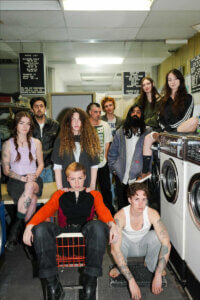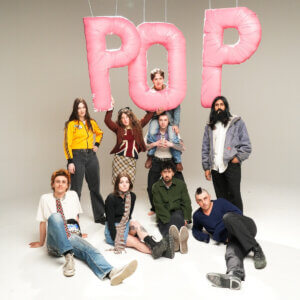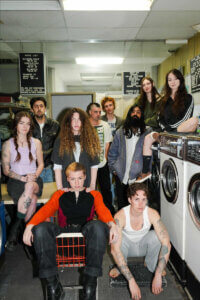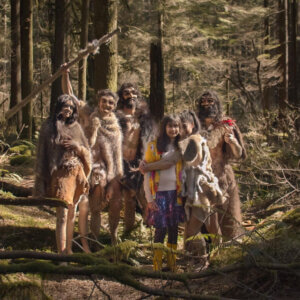Crack Cloud goes the distance on Red Mile
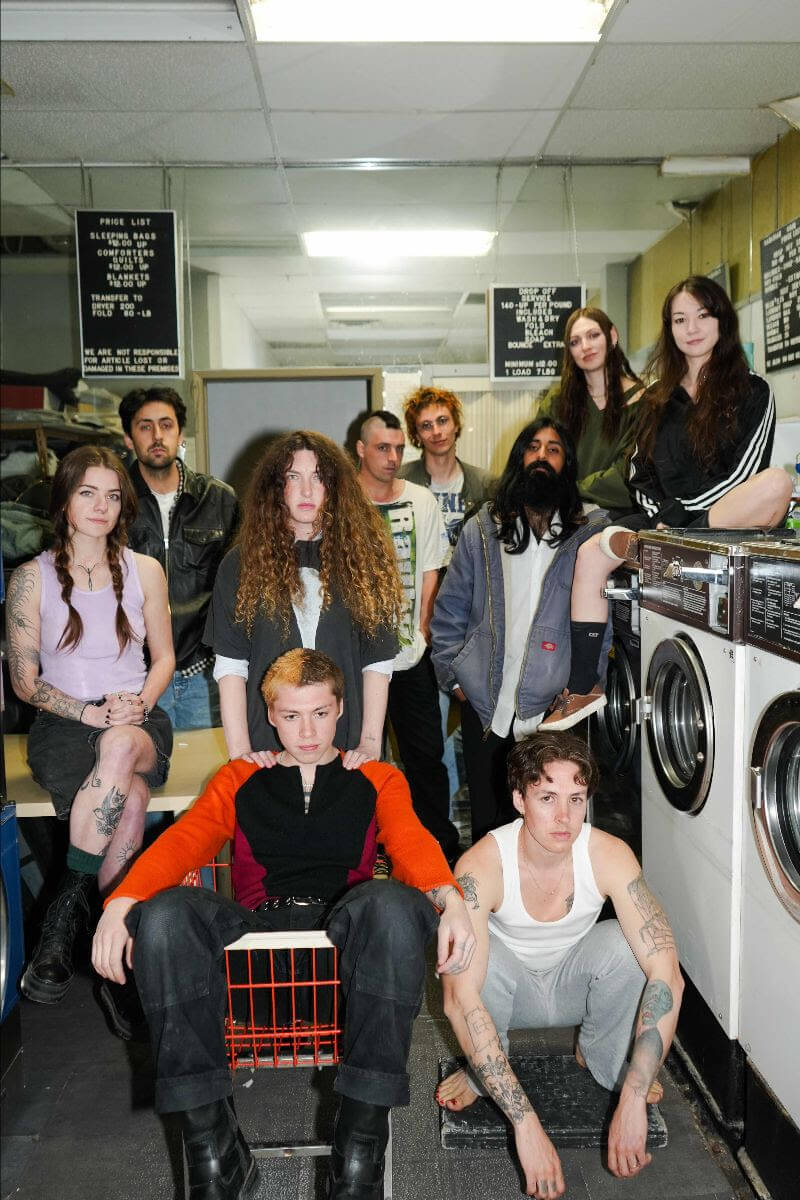
Accompanying Red Mile, the third studio album – and first to be released with Jagjaguwar, with whom the Canadian collective announced their signing to earlier this year – Zach Choy, the founding member of the ever-evolving, both in style and structure, art-punk outfit Crack Cloud penned a letter expanding upon their latest body of work. “The music of Red Mile came naturally, and of its own volition. The Mojave had an elemental effect,” Choy describes. “The seemingly never-ending labyrinth of touring into exhaustion that characterized preceding years. And the externalization of Crack Cloud’s mythology, displaced and dismantled as we’ve grown out of ourselves, constantly, creatively reborn, by virtue and design. This is how I would describe Red Mile, and more generally, the group’s freefall, nearly a decade in the making.”
Red Mile hears the band, who have continuously produced music that is thrilling and thought-provoking since breaking through with their 2020 LP Pain Olympics, a release that rapidly broadened their fanbase following the self-titled compilation which housed their first two EPs under one roof, going back in time with their musical sensibilities. There are fleeting moments, whether it’s Choy’s vocal performance or certain tonal motifs that herald the sonic personality of The Sex Pistols, The Clash, New Order, Pink Floyd and, most prevalent amongst them, The Ramones. They’ve swapped chaotic howls for contained croons across these eight compositions which, by no means, have not toned down their distinct vivid and visceral melodic urges. Red Mile’s tempo may not be what you’d expect from a Crack Cloud record but then again, it’s not wise or, indeed possible, to think you know what they’ll do and how they’ll sound when they pick up from where they left you. That unpredictability in their instrumentation is a huge part of the Calgary-based collective’s appeal alongside their resonating and socially conscious lyricism and this sense of raw, human wonderment is abundant on their latest offering.
Ahead of the release of their most tonally concise and melodically cohesive (not to mention, engaging and irresistibly brilliant) album, Aleem Khan, Bryce Cloghesy and Zach Choy spoke to Northern Transmissions about the development of Red Mile, performing in a former slaughterhouse and the artist as a spokesperson.
Northern Transmissions: Red Mile is out in a few days, what kind of feelings are you having ahead of its release?
Bryce Cloghesy: Personally, I think we are all, from my perspective, trying to remove ourselves a little bit from the chaos that is the release and it’s just a moment of letting go. And, also, you know, every piece of art that you put out into the world is an accomplishment in its own way, just the risk of it and the reward of it. So, yeah, I’m just trying to stay present and not too indulgent!
Aleem Khan: Yeah, to go off what Bryce is saying, I think this project, creatively, is one of the first times that, or well, it is the first time that all three of us have really embarked on creating something cohesive together. This is the core unit currently as it stands of Crack Cloud in terms of the song writing and things like that. There were a lot of other really brilliant contributions on the record from other sources, if you check out the [album] sleeve, you’ll be able to see who those people are. But, I think putting out a record in 2024, albeit a rock record, is a polarizing kind feat given the history of this genre, given the history of rock and roll, given the history of, I think, humanity and life itself, we’ll put it that way, broadly. The greatest accomplishment in my eyes for us is the solidarity in creativity and just the heart and love that we all tried to keep present in our work.
Zach Choy: Yeah, I’m with you all. I’ve expressed this more than once; it’s a spiritual decision, I think that I hit my high, I hit my catharsis during the making of this album, and it’s always such a blessing to come back to these artifacts, in retrospect. It’s a really remarkable way to get to know yourself during that time, looking back, there’s a lot that is revealed to you from just listening to the music a year later or five years later. But like I say, spiritually, I feel at peace with surrendering and attaching to [Red Mile]. Personally, I’m going to hit the road the day the album comes out. I’m going on a road trip with my wife and my dogs and my brother Will and my mom, and we’re going to fuck-off for a few days and be out in the woods. That’s usually what I do when we put an album out and it works for me!
NT: That’s really nice! I guess you’ve all lived in and with the album for so long at this point. Now, you’re at the point where it becomes something you share with audiences and your fans and it takes on a new life-stage.
Zach Choy: Yeah, it becomes trivial, or, it becomes part of the dialogue, it becomes something that is scrutinized and becomes something that hopefully can be inspiring. That’s always what we’re hoping to do, is to establish some sort of connectivity with other people of our generation. But yeah, you have to be ready, I think, as a creator for the whole experience and just the whole subjectivity of the world and possibly how we perceive and perceive things in these moments. Because of that, I tap out because my relationship to the music is a really hard thing to try to communicate that, like that subjectivity to the listener. I think that the really intriguing thing about art is you’re taking something so personal and you’re trying to convert that minutia into a universality or something that can be interpreted in a lucid way. What keeps me doing what I do, and maybe to speak on the whole institutional part of creativity, there’s this lineage of trying to create a language that just breaks through which is ongoing and it’s a
fun thing to participate in.
NT: Absolutely, and from listening to the new album, it sounds like it was very fun to build the musical world of it. I was really struck by the differences in the instrumentation and production compared to the previous albums. Here, there was an air of The Ramones and their nod to the 1950s elements, too. I’d love to hear about the initial stages of developing a Crack Cloud album, especially this one because musically it’s so vast and it’s so textured which is such a treat as a listener but I can only imagine it can be a tricky thing to navigate while you’re in the process of making it.
Aleem Khan: It’s very nice to hear when things musically translate because the only language is the notes that the language isn’t developed, you know, it’s not English or Chinese or anything. History within this art form is priceless and I think how many times it’s been bastardized has been apparent since its birth. And so I think that the commentary again, like you’re saying the ‘50s and ‘60s was pretty much the framework of the sound for whatever’s going to come after it. So whatever the 70s was, whatever the punk movement was was from people saying, ‘Hey we’re listening to our parents records, we disagree with the sentiment but we’re going to use this platform and you’re going to really hate us for it because it represents all your politics and the way that we’re going to switch it up is going to represent our politics. So hey, we got the radio now!’. That was really terrifying for people at that time and I think to this day, still is. Those sentiments permeate our pop culture and they’ve never left so far as the four chords used on the medium, so far as the melody on the medium.
But in terms of the production, it really is just little snacks of ideas that we share with each other and we really enjoy the taste!
Bryce Cloghesy: I do think that the approach was a little bit different this time from just maturing and growing and just following the breadcrumb trail and our intuition. The things we gravitated towards had more of an organic approach which I think is very much in line with some of that older, more romantic styling and I think it’s a reflection of where we’re at, too. Which is exploring these perhaps new sonic emotions and continuing to push the boundary of what a Crack Cloud song could be and bringing in influences that we love or that are becoming more relevant to us now. I think it was a lot of just feeling it as a group and experimenting and absorbing and it’s really just a reflection of where we’re at now. I mean, how the music came out it’s just a kind of a document of a time and place. That’s like what Zach’s talking about with looking back five years later and something is revealed in that. Especially when you follow your heart or follow your gut. So yeah, it just felt good to explore and I do think Crack Cloud’s been traditionally associated, especially with earlier records, with kind of the post- punk movement and some more angular sounding and harder darker emotions so I think it was really enlivening for us to to dig into the roots of that; the roots of post-punk is punk music and the roots of punk is rock and the roots of rock is folk and it just keeps moving backwards and pulling from all of this into a cohesive whole. I mean, that’s very like postmodern of our time now, in a way.
Zach Choy: Also just finding utility outside of cynicism, outside of edginess . I think that cynicism is kind of the modality that we defer to as a generation and I wonder if a lot of that has to do with social media; what we’re exposed to now as far as our awareness and all of the tragedy and suffering in the world. I think cynicism, naturally, is a mechanism that allows us to not only cope but feel like we’re confronting the human condition in a way that is urgent. After feeling cynical for so long, we couldn’t shake this feeling of frankly just exhaustion of that and exhaustion of us trying to keep up with the momentum of of just that visceral commentary of what it means to be an artist and trying to confront all of these macro subjects as well as like looking inward and trying to confront a lot of the micro.
In a way, Crack Cloud and music for a lot of people is like therapy. You’re constantly revisiting and analyzing yourself and to be doing that around the calendar year is really intense. I’m not begrudging of it, but it’s not for the faint of heart and it’s not always healthy and it can lead to a lot of turbulence for people and we see that in the culture with drug use and suicide associated with rock music and with music, generally. I think these were feelings that kind of just accumulated over years and were especially compounded during the four months that we spent touring Tough Baby in 2022 and that was really a climax as well as the catalyst for us to feel like for ourselves we needed to change gears and for ourselves we needed to explore this other less sensational emotion, exhaustion specifically, and the value and humility and be in quietude. I think these are some emotions that we really didn’t even try to capture so much as just were intrinsic to how we approached the production and the writing. To be in the desert and be recording off the floor with no real contrivances or preconceptions because the last two albums were these lofty concept albums and they were planned and they had story arcs, I think [Red Mile] was way more intuitive. There was no pretension of feeling like we needed to hit some specific stride that would speak to the times. It was this thing of having faith in the fatalism of it all. I would just say that as much as it is or was a reflection of ourselves and every record we put out, and more broadly speaking everything that any human being does in their life, it has a cumulative effect on who they are and who they become and Red Mile is absolutely like a puzzle piece by sound. I expect the next record to sound as different as Red Mile sounds in terms of influences and that’s what is really invigorating about art and life, broadly. To get a lot of these feelings out of our system on Red Mile is what makes it a vital preoccupation for us.
NT: Listening to you talk Zach, I couldn’t help but think of the song “Epitaph” on the new album where there are lyrics like “Why can’t I say what’s on my mind? Why are the words so hard to find?” or “What do I need to say / Why do I have to say it?” and “Writing with some vague intent like pulling hair out of cement”. You talk about the role of an artist and the responsibility placed on musicians for social commentary but with how desolate and devastating the world is right now, it can be hard to find the words to articulate how you feel. I found it refreshing to hear that position on “Epitaph” and appreciated that openness. Can you tell me a little about the lyrical approaches and processes you have as a group because the words are such an integral element to Crack Cloud’s music.
Zach Choy: That’s really validating to hear about “Epitaph”, because I had so much fun spitting that one out very much in this kind of scream of consciousness, inquiry into the tradition of written word and just from an epistemological point of view of what was the intention when the writer was committing the story of Gilgamesh for the stone tablet? What was Goida’s intention? What was Nietzsche’s intention? I mean, he drove himself to insanity from being a filter for his observations during that time. I just find it so intriguing, you know, the lineage of written word from the beginning and what prompts us to continue to carry this narrative forward and where is it leading and at what point does language become ineffective? And to a degree, language is a limited modality. That’s where music steps in and art.
I think that you hit it on the head and I’m sure this is and will sound naive, 50 or 100 years from now, this general expression that we’re in this post-historical world and everything already happened in the twentieth century and that’s not for us to really declare. And I’m sure that human trauma will continue and we will and have already seen a lot in our own lifelines, as far as the people in this room right now. That song just came from a place of curiosity, I think. It was refreshing because it was less about the self and more about the macro and I guess where the self fits into the narrative as an iteration. Yeah, that was fun.
NT: Touring and performing live has always been so important to Crack Cloud not only to share your music with crowds but to build community with your audiences through your music. What have been some of your favorite tour memories or unexpected moments that have happened during a show that have stayed with you?
Aleem Khan: I think, for myself, something I really value is just truly through this platform, through this uncertain opportunity, put it that way, that it’s an extreme privilege just to meet new people. To meet humans that share the same love for things that you have, you know, people who may disagree with you, people who may agree with you. These things are just extremely priceless and these relationships are very long lasting through art and through music. Through this simple idea of community, that we’ve all kept alive through the art, through the history, through the hardship, through the chaos, when you hear, and I think literally every artist has said this, but when you just hear how someone feels about the job that you just did on stage an hour ago, it really does make things worthwhile when you get that direct line. And that’s not about money and that’s not about charting, that’s not about selling records. It’s really keeping it alive and whatever it is, is up to you, you know.
Bryce Cloghesy: In a more introverted sense, I would say that one of my favorite aspects, favorite moments when we’re sharing this music is every once in a while there’s a moment when you’re playing to people where you close your eyes and get lost in your own world and lose yourself and those are really precious moments. It’s almost like meditation where you can sink in and really feel like this moment is long lasting. This moment is eternal, you’re like, ‘I’m here now, the eternal present’. I feel like there were some moments when we were recording, too, of just feeling that space and closing your eyes and just feeling it. That’s a precious feeling. I feel like you can sense it when as a listener, as a witness to it, you can tell when the artist is really tapped in or not.
Zach Choy: The memory that I can think of now is from the last tour we played in Belgrade and Serbia in a slaughterhouse or what was a slaughterhouse. It was structurally intact, but very stripped down and you know, the ceiling was exposed and the audience was comprised, it was split down the middle, it was 50% Ukrainian, 50% Russian, according to the promoter who was also an expat from Russia and it was visceral and it was just… it was an atmosphere. It was really beautiful, though.
Bryce Cloghesy: Yeah, a lot of people had fled from the war, which had more recently broken out and so a lot of people had left Russia specifically or Ukraine specifically because of the war. And so, those people were gathering for music from all different backgrounds and for us getting a direct line of communication and hearing their stories was definitely very meaningful.
Zach Choy: I think that show actually was derivative of a festival that we were supposed to play in Moscow and those people were chased out of Moscow around the time of the war and they resettled in Serbia where they fostered this really inclusive community. We spent maybe a week? Maybe a bit less than a week there? But yeah, it was, it felt like a moment.
Aleem Khan: Yeah, we met a lot of very genuine people.
NT: To have that experience where you’re playing music to help people who have come from very traumatizing situations and have had to flee their home, you’re providing them with an hour to forget about all of that and to become completely immersed in music. To have also had the opportunity and time to talk to those people, I’d say that was just incredible.
Zach Choy: Yeah, it’s history. That’s what it is! When we’re traveling, especially in Europe, I mean, we come from Calgary, Alberta, it’s a small, oil city, the southernmost border of Canada and our country is less than 160 years old and it has its own history in the making, but it’s not as, I guess, tactile or the aura is different. So, it’s always just a sensory overload when we go abroad.
NT: Yeah, I can imagine. Finally, what are some of the songs from Red Mile that you’re particularly excited for people to hear for the first time or to play for audiences when you go out to tour the album?
Zach Choy: I’ve learned that all that Crack Cloud fans want to hear is “Drab Measure”. I don’t know who our fan base is! I think that we’ve lost our fan base three times over! I feel like we offend people every time we put an album out and I get a bit of enjoyment out of that. It’s not deliberate, of course. We’re just a self-actualizing project and there’s no way in hell we’re going to do “Drab Measure” again and again and again for the next 20 years. I feel truly grateful for the people that have grown with us and have resonated with the fluctuations in our style and in the dialectic that we’re facilitating. I think that’s so cool and as a fan of music, I gravitate most to artists that, over the course of their lives or their careers, have changed. I find a lot of inspiration in that, but like I say, I’m checking out on Friday, the day when the album comes out and I’m getting the fuck out of dodge!
Bryce Cloghesy: I resonate with that, but to answer maybe a little bit more directly, I do think that the energy on the new material is a little bit more subdued and open to some exploration. So, I do think just sharing some of the more down-tempo, melancholic songs, like you mentioned “Epitaph” or “Lost On The Red Mile” or “Crack of Life”, I think those will resonate in a new way that Crack Cloud hasn’t really done before. We’re excited to share some of the material that expresses a bit of that and just reach out and take some emotional risks and share some music that’s a little bit different than previous material. Specifically, some of the more spacious songs like ‘Lost on The Red Mile” is going to be really nice. “Lack of Lack”, started out as this sort of endless jam that was performed on a moving truck in a protest. I think adapting the record to a live situation is going to be an invigorating experience for us.
Aleem Khan: For myself, I think from the first track, “Crack of Life”, to the final track, “Lost On The Red Mile”, you will go through many lives! You will go through many evolutions, revolutions. You’ll get broken down and built back-up. I can’t necessarily pick one song or two or three. Exactly what Bryce said, I absolutely agree with that and with those tracks in particular, “Crack of Life”, “Epitaph”, “Lost on the Red Mile”. That final song, though, “Lost On The Red Mile”, I think I’m most excited for people to hear to get to the end from the beginning. I think the emotion in that song is, you know, take away all the cynicism, take all the, ‘Hey, I’m so bummed out about this and that’, and just get out of your body, get reborn. I’m just really excited and grateful for the opportunity for everyone to listen to the whole album from start to finish and track by track. Yeah, it’s from the creative process it’s sobering. You come out of that and you’re on to round two, start some new work and see where it goes and always happy to
be here.
Pre-order Red Mile by Crack Cloud HERE
Latest Reviews
Tracks
Advertisement
Looking for something new to listen to?
Sign up to our all-new newsletter for top-notch reviews, news, videos and playlists.





